I have a string which looks like BAT | CAT | RAT | MAT I want to split this string into 4 parts and then store them into 4 different variables say .. @a,@b,@c,@d respectively.
How can it be done in sql?
I have a string which looks like BAT | CAT | RAT | MAT I want to split this string into 4 parts and then store them into 4 different variables say .. @a,@b,@c,@d respectively.
How can it be done in sql?
for splitting around a char :
DECLARE @A VARCHAR (100)= 'cat | bat | sat'
SELECT items
INTO #STRINGS
FROM dbo.split(@A,'|')
also see this link
DECLARE @test varchar(max);
set @test = 'Peter/Parker/Spiderman/Marvel';
set @test = Replace(@test, '/', '.');
SELECT ParseName(@test, 4) --returns Peter
SELECT ParseName(@test, 3) --returns Parker
SELECT ParseName(@test, 2) --returns Spiderman
SELECT ParseName(@test, 1) --returns Marvel
SQL Server 2005 : split string into array and get array(x)?
workarounds for splitting strings:
http://www.sqlperformance.com/2012/07/t-sql-queries/split-strings
Nice and simple. (Using PATINDEX in Microsoft SQL Server Management Studio.)
DECLARE @string varchar(25) = 'BAT | CAT | RAT | MAT'
DECLARE @one varchar(5) = null
DECLARE @two varchar(5) = null
DECLARE @three varchar(5) = null
DECLARE @four varchar(5) = null
BEGIN
SET @one = SUBSTRING(@string, 0, PATINDEX('%|%', @string))
SET @string = SUBSTRING(@string, LEN(@one + '|') + 1, LEN(@string))
SET @two = SUBSTRING(@string, 0, PATINDEX('%|%', @string))
SET @string = SUBSTRING(@string, LEN(@two + '|') + 1, LEN(@string))
SET @three = SUBSTRING(@string, 0, PATINDEX('%|%', @string))
SET @string = SUBSTRING(@string, LEN(@three + '|') + 1, LEN(@string))
SET @four = @string
SELECT @one AS Part_One, @two AS Part_Two, @three AS Part_Three, @four AS Part_Four
END
You can split the values and insert them in a table variable, then assign them to your variables like this:
DECLARE @DataSource TABLE
(
[ID] TINYINT IDENTITY(1,1)
,[Value] NVARCHAR(128)
)
DECLARE @Value NVARCHAR(MAX) = 'BAT | CAT | RAT | MAT'
DECLARE @XML xml = N'<r><![CDATA[' + REPLACE(@Value, '|', ']]></r><r><![CDATA[') + ']]></r>'
INSERT INTO @DataSource ([Value])
SELECT RTRIM(LTRIM(T.c.value('.', 'NVARCHAR(128)')))
FROM @xml.nodes('//r') T(c)
SELECT [ID]
,[Value]
FROM @DataSource
The result if this query is:

Note, this technique is dynamic - it will split any count of strings split with | and store them in table variable table.